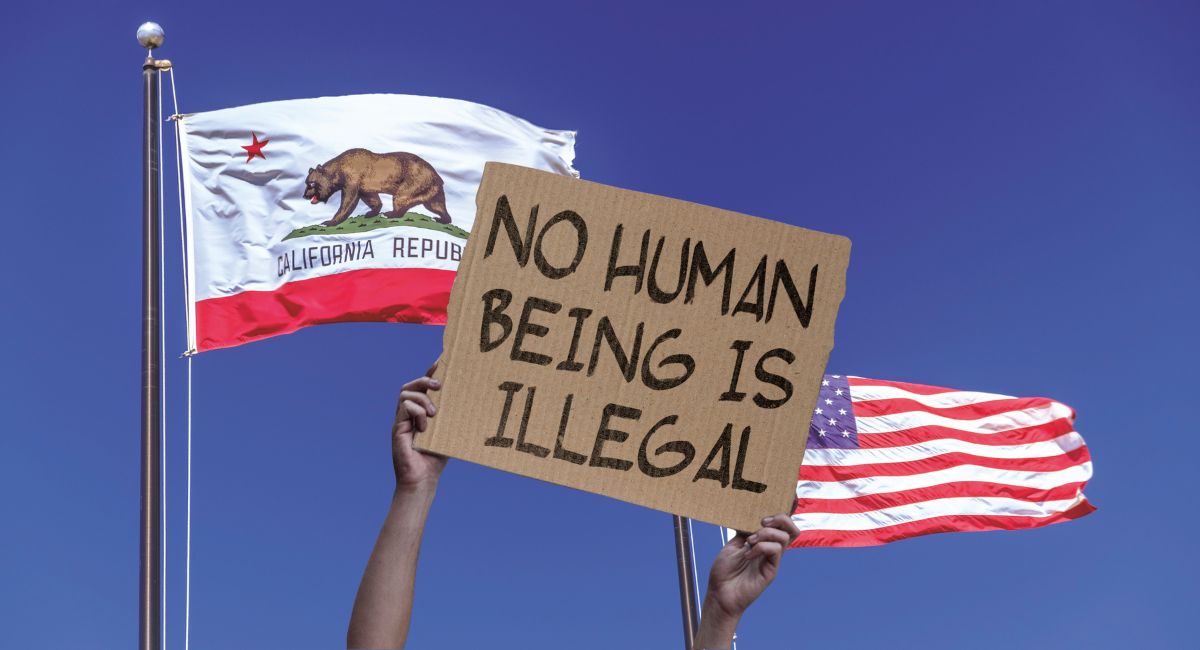As masked agents sweep Los Angeles, a frontline immigration lawyer sounds the alarm—and sparks statewide resistance
Magazine, The Immigrant Experience
Since his first term, President Donald Trump has often clashed with California, a stronghold of progressive policies on immigration, healthcare, the environment, and social issues that oppose his administration’s agenda.
California’s large immigrant population and protective laws have made it a frequent target. The state has been reliably Democratic since the 1990s, following the decline of Republican influence after Pete Wilson’s 1994 Proposition 187, which aimed to restrict immigrant access to education and healthcare.
Immigration recently sparked a major standoff between Los Angeles and the administration. Immigration raids escalated tensions, leading to protests and the deployment of the National Guard and Marines, culminating in the largest single-day protest in U.S. history.
In response, American Community Media convened a special briefing featuring four key voices: California Attorney General Rob Bonta, former LA Mayor and gubernatorial hopeful Antonio Villaraigosa, Jeanette Zanipatin of CHIRLA, and UC Berkeley professor Dr. Henry Brady. Together, they examined the legal, political, and humanitarian dimensions of the crackdown—and what comes next.
The 7 a.m. knock wasn’t just early. It was violent.
Outside an apartment in East Los Angeles, a line of masked figures in civilian clothes yanked a gardener from his doorstep. No badges. No names. Just military-grade gear and a van with out-of-state plates. “We thought it was a kidnapping,” whispered a neighbor.
But it wasn’t. It was America—2025 version. And Jeanette Zanipatin had seen it all before breakfast.
A seasoned immigration attorney and policy director at CHIRLA, Jeanette has spent nearly three decades defending migrants in courtrooms. But this? This was different. “We’ve never seen anything like this,” she said. “Not even during the Bush or Obama years. The arrests. The court ambushes. The masked agents are refusing to identify themselves. It’s not just cruel—it’s unconstitutional.”
Jeanette’s team runs LA’s Rapid Response Network, dispatching volunteers to confirm ICE raids in real time. Lately, their phones haven’t stopped ringing.
People are being arrested outside immigration courtrooms, at routine check-ins, and even during USCIS interviews. “Clients go in to follow the law,” Jeanette said. “They leave in handcuffs.” In one case, CHIRLA lawyers were barred from seeing detained clients for days. In another, even members of Congress were denied access to detention centers.
Then there’s the eerie anonymity. “No ID. No warrants. Just people in ski masks switching license plates,” she said. “Who are they? Deputized agents? Private contractors? We have no idea.”
California Attorney General Rob Bonta, joining the briefing with a call for calm but firm resolve, underscored the state’s commitment to defending constitutional protections. He acknowledged that while federal authority cannot be physically blocked, California is actively pursuing legal avenues—including injunctions, state-level challenges, and new legislative safeguards. “We are committed to the rule of law,” Bonta said, affirming that the state would use every legal tool to oppose blanket raids and racial profiling.
The raids escalated into something even more chilling: National Guard and Marines deployed in LA’s immigrant neighborhoods. Flash-bang grenades in school zones. Nannies dragged from playgrounds. Marines were posted outside grocery stores.
“This is a militarized operation against civilians,” Jeanette said. “Even U.S. citizens are being arrested. We’ve documented at least three.”
Former Los Angeles Mayor Antonio Villaraigosa, whose decades-long advocacy began during California’s battles against Proposition 187, echoed the urgency with historical weight. He warned that the present echoes past injustices—from the mass deportations of the 1930s to Operation Wetback in the 1950s—but with unprecedented scale and secrecy. “They come in like ghosts,” he said. “You blink, and your neighbor’s gone.” His call was clear: this isn’t a partisan moment; it’s a test of America’s democratic soul.
That ripple of fear has emptied sidewalks and silenced markets. Parents skip school drop-offs. Churches and clinics see fewer faces. But mutual aid is rising to meet the void. “People are dropping food, sharing legal info, and checking on neighbors,” Jeanette noted. “The community isn’t giving up.”
Meanwhile, UC Berkeley professor Dr. Henry Brady laid bare the long-term damage beyond the raids: a projected $275 billion blow to California’s economy, drawn from labor loss, weakened healthcare systems, and stagnation in higher education. He warned that undermining immigrant labor would cripple sectors from construction to eldercare, and the chilling effect on university enrollment would risk eroding California’s status as an innovation leader. “It’s not just morally wrong,” Brady cautioned. “It’s economically catastrophic.”
State officials aren’t staying silent. Rob Bonta confirmed legal challenges are underway. Bills are moving through the state legislature to ban masked raids and enforce identification requirements.
“This isn’t just an attack on immigrants,” Villaraigosa said again. “It’s an attack on the American model of democracy.”
Wildcard Metaphor
Jeanette likens the moment to an eclipse. “You’re walking in daylight,” she said. “Then suddenly, everything darkens. The sun is still there. But hidden.”
Her job, she says, is to bring back the light. One habeas filing. One hotline call. One protest chant at a time.
Because in California, the resistance is not rhetorical. It is lived daily.
And in the shadows of this crackdown, Jeanette Zanipatin stands like a torchbearer—not just for her clients, but for the country we still hope to be.
Stay proud, stay grounded, stay true.
#ImmigrantRights #StopTheRaids #CaliforniaAgainstICE #ProtectImmigrants #NoMoreGhostRaids #JeanetteZanipatin #CHIRLA #AmericanDreamUnderSiege #ImmigrantJustice

